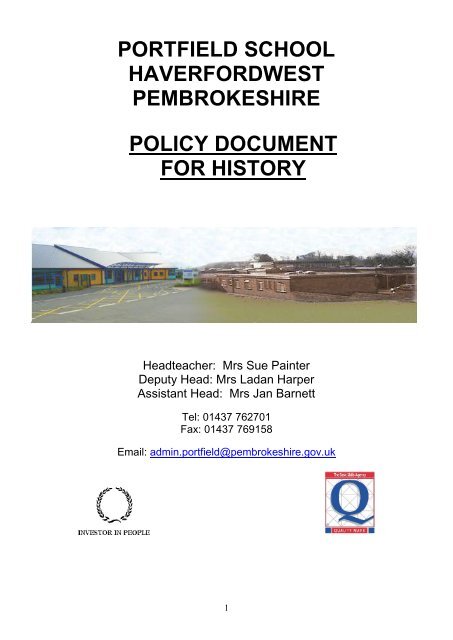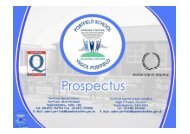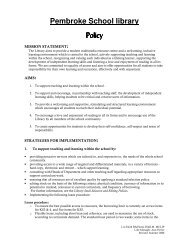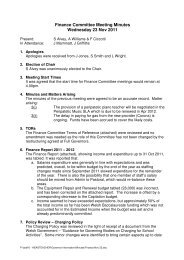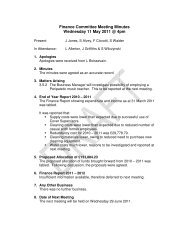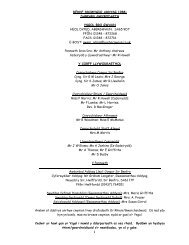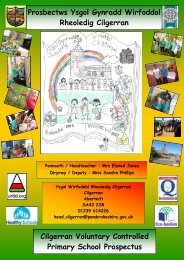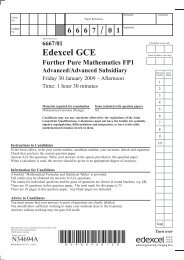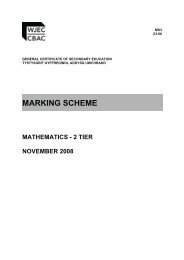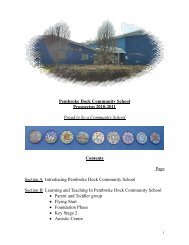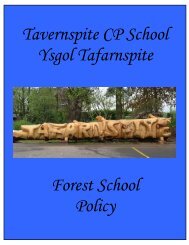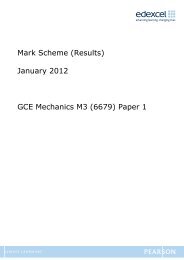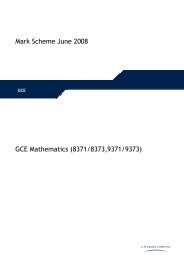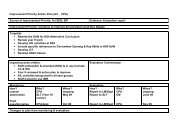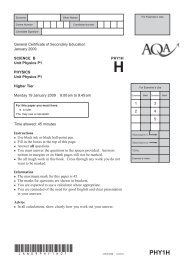portfield school haverfordwest pembrokeshire policy document for ...
portfield school haverfordwest pembrokeshire policy document for ...
portfield school haverfordwest pembrokeshire policy document for ...
You also want an ePaper? Increase the reach of your titles
YUMPU automatically turns print PDFs into web optimized ePapers that Google loves.
PORTFIELD SCHOOL<br />
HAVERFORDWEST<br />
PEMBROKESHIRE<br />
POLICY DOCUMENT<br />
FOR HISTORY<br />
Headteacher: Mrs Sue Painter<br />
Deputy Head: Mrs Ladan Harper<br />
Assistant Head: Mrs Jan Barnett<br />
Tel: 01437 762701<br />
Fax: 01437 769158<br />
Email: admin.<strong>portfield</strong>@<strong>pembrokeshire</strong>.gov.uk<br />
1
INTRODUCTION<br />
This <strong>document</strong> is a statement of the philosophy, aims and objectives, teaching and<br />
learning strategies of History at Portfield School. It was developed during July 2003<br />
through a process of consultation with teaching staff and fully revised in March 2010.<br />
At Portfield School we strive to:<br />
Work together Learn together Achieve together<br />
<br />
<br />
<br />
<br />
<br />
<br />
Create a happy, safe, supportive and stimulating learning environment<br />
Value everyone<br />
Develop everyone’s personal, social, emotional health and wellbeing<br />
Promote relevant academic and vocational skills<br />
Meet individual needs through an imaginative and flexible approach<br />
Enable all learners to achieve their full potential<br />
Our Philosophy of History<br />
The study of history enables our pupils to develop an awareness of the past and how it is<br />
different from today. In doing so they should simultaneously gain some understanding of<br />
some of the ways in which we find out about the past. The essential point <strong>for</strong> our pupils in<br />
studying history is that things change and that this has relevance <strong>for</strong> everyone. Looking at<br />
history can enable us to prepare pupils <strong>for</strong> changes in their own lives. We believe that if<br />
‘history’ is to have any meaning <strong>for</strong> our pupils we must start with familiar situations and<br />
progress to those more distant in time and place.<br />
Consequently, pupils will begin by looking at changes in their own lives and those of their<br />
family and others around them. This would include practical experience of families, every<br />
day modern objects and their historical counterparts. Having learned about personal<br />
history, pupils then progress to study history in the local environment. This is supported by<br />
the use of pictures, photographs, adults talking about local history and visits to key<br />
buildings and sites. Pupils build on their awareness of the past and broaden their<br />
understanding to include some major historical events and significant social changes.<br />
Where appropriate, pupils study more distant historical periods and a wider range of<br />
national and international concerns.<br />
History has an important role to play in promoting curriculum Cymreig and contributing to<br />
education <strong>for</strong> citizenship.<br />
Aims of the History Curriculum<br />
<br />
<br />
<br />
<br />
To enable students to develop a curiosity in and an understanding of the past.<br />
To enable students to develop a knowledge and understanding of sequences,<br />
routines and chronological patterns in their daily lives and in the wider world.<br />
To enable students to develop an understanding of their own personal history.<br />
To enable students to develop knowledge of how people lived in the past and how<br />
this was different from today.<br />
2
To enable students to develop knowledge and understanding of significant people<br />
and events in the past and their influence upon the present.<br />
To enable students to develop knowledge and understanding about major events<br />
and issues in the history of their local area in Wales.<br />
Learning outcomes: Experiences, skills and concepts in History<br />
Experiences<br />
Pupils should experience repetitive, predictable sequences, gaining an anticipation<br />
of the immediate future based upon memory of the immediate past.<br />
Pupils should remember familiar events from week to week and day to day, based<br />
on real object or real experience reminders of those events.<br />
Pupils should develop a concept of object permanence, which will lead to being<br />
able to search <strong>for</strong> objects they have seen hidden in the immediate past.<br />
Experiences should involve practical opportunity as often as possible.<br />
Students should use all their senses in historical study:-<br />
<br />
<br />
<br />
<br />
<br />
Sight – outings and visits, videos, TV, slides and photos.<br />
Hearing – sound effects, music, speech and language<br />
Smell – food, artefacts<br />
Taste – food and drink<br />
Feel – touch and handle artefacts<br />
Skills and concepts<br />
Pupils will recognise themselves and other people in pictures of the recent past.<br />
Pupils will link the passage of time with a variety of indicators e.g. weekend - home,<br />
summer - holidays, winter – Christmas.<br />
Pupils will respond to photograph and video prompts demonstrating an awareness<br />
that they took part in past events.<br />
Pupils will communicate in their preferred way about activities and events in their<br />
immediate past.<br />
Pupils will (perhaps with prompts) answer simple questions about an historical<br />
artefact or building.<br />
Pupils will recognise themselves and people from the more distant past thereby<br />
recognising the difference between past and present.<br />
Pupils will pick out an old object from a collection of items.<br />
Pupils will sort objects between old and new.<br />
Pupils will listen to and follow stories about people and events in the past.<br />
Pupils will indicate if personal events and objects belong in the past.<br />
Pupils will learn and use a vocabulary relating to the passage of time.<br />
Pupils will use research methods to investigate the past e.g. books, IT.<br />
Roles and Responsibilities<br />
Each member of the teaching staff will have responsibility <strong>for</strong> the teaching of history and<br />
they will need to ensure that their knowledge is continually updated. The <strong>school</strong> has a<br />
history co-ordinator. It is their role to:-<br />
<br />
Take the lead in <strong>policy</strong> development and production of the schemes of work,<br />
ensuring continuity and progression across the <strong>school</strong>.<br />
3
Support colleagues in teaching the subject content, development of planning,<br />
implementation of the scheme of work and in assessment and record keeping<br />
activities.<br />
Monitor progress in history and report back to staff, headteacher and governors on<br />
progress through a planned cycle of monitoring.<br />
Take responsibility <strong>for</strong> the purchase and organisation of central resources <strong>for</strong><br />
history and relevant ICT resources.<br />
Keep up to date with development in history through Inset, the Historical<br />
Association and relevant websites.<br />
Disseminate this in<strong>for</strong>mation to the staff.<br />
Keep people in<strong>for</strong>med of possible visits, exhibitions and courses.<br />
Organisation of teaching and learning<br />
The organisation of teaching and learning <strong>for</strong> history in the <strong>school</strong> follows a variety of<br />
<strong>for</strong>mats. These include:<br />
Whole class lessons with introductions involving direct teaching, use of video<br />
material and visiting speakers.<br />
Group work, e.g. handling artefacts, photographs, pictures and maps<br />
Individual work, e.g. producing a piece of extended writing to present in <strong>for</strong>mation<br />
gained,<br />
The use of ICT<br />
The use of fieldwork<br />
Key skills will be covered as appropriate to the area of study.<br />
Project days e.g. WWII, Roman Chariot racing.<br />
Fieldwork is an important strategy <strong>for</strong> the teaching of history in the <strong>school</strong>. Pupils<br />
undertake fieldwork within the local area when appropriate. Other visits to museums,<br />
buildings and sites of historic interest are an important element of history in the <strong>school</strong>.<br />
Staff follow the <strong>school</strong> and county guidelines when taking pupils on field visits outside the<br />
<strong>school</strong> grounds. Every member of staff has a copy of these guidelines.<br />
<br />
<br />
<br />
<br />
ICT is used within the <strong>school</strong> to enhance and improve the teaching and learning of<br />
history. This takes the <strong>for</strong>m of:<br />
ICT <strong>for</strong> teaching including videos, audios, power point presentations<br />
ICT <strong>for</strong> learning: word processing, desk-top publishing, databases, timelines<br />
software, websites, encyclopaedia CD Rom, subject specific simulation<br />
programmes.<br />
ICT <strong>for</strong> access.<br />
Foundation Phase – Historical content is accessed through Knowledge & Understanding of<br />
the World activities and are noted in schemes of work.<br />
KS2 – 4 year cycle of topics.<br />
KS3 - Y 7, 8 and 9 - Work on one year’s work each year, appropriately differentiated.<br />
(KS4 - Pupils work on the Welsh heritage project annually<br />
Welsh Heritage Project is completed annually by all Key Stages.<br />
Key Skills<br />
Key skills are highlighted in each KS SOW to show appropriate coverage. All teaching is<br />
appropriately differentiated to accommodate individual needs.<br />
4
Developing Thinking<br />
Pupils should be given opportunities to develop thinking across the curriculum through<br />
planning, developing and reflecting during historical enquiry and reflection on key<br />
questions, ideas and interpretations.<br />
Developing ICT<br />
Pupils should develop ICT skills across the curriculum by finding, developing, creating and<br />
presenting in<strong>for</strong>mation and ideas using a wide range of equipment and software.<br />
Curriculum Cymreig<br />
The teaching of history is a means of prompting the Curriculum Cymreig. The <strong>school</strong> does<br />
this by:<br />
<br />
<br />
<br />
<br />
<br />
Developing teaching and learning about the local area<br />
Using stories set in places and at different times in Wales to develop historical skills<br />
and understanding<br />
Developing knowledge and understanding about events which happened in Wales<br />
and about famous Welsh personalities<br />
Developing knowledge and understanding about the social and cultural changes in<br />
Wales and the causes and consequences of those changes<br />
Developing a chronological understanding of the key events in Welsh history<br />
Developing Communication<br />
Pupils should be given opportunities where appropriate to develop and apply their skills of<br />
oracy (speaking, listening) reading, writing and expressing ideas through a variety of<br />
media across the curriculum.<br />
Developing Number<br />
Pupils should be given opportunity where appropriate, to develop and apply their number<br />
skills across the curriculum using mathematical in<strong>for</strong>mation, calculating and interpreting<br />
and presenting findings.<br />
Working together – project days.<br />
Planning and entitlement<br />
Planning <strong>for</strong> history is a process in which all staff are involved and supported by the history<br />
co-ordinator. The basis <strong>for</strong> curricular planning are the KS SOW (see Appendix 1).<br />
The School development plan also identifies when the subject is under focus, review,<br />
maintenance. The class teacher draws up termly plans.<br />
All children regardless of race, gender and physical ability will be given access to the<br />
history programme at a level appropriate to their individual needs. Those children who are<br />
working below the levels defined by the National Curriculum History <strong>for</strong> their Key Stage –<br />
follow programmes of study from ‘Equals’.<br />
At foundation level programmes relate to the pupils lives, the adults and locality familiar to<br />
them. Pupils will also investigate aspects of the life of people from Wales and Britain<br />
across the ages. Historical aspects are incorporated into themes and historical change and<br />
development within a theme are explored.<br />
Assessment, Recording and Reporting<br />
Assessment, recording and reporting in history is carried out in accordance with the<br />
<strong>school</strong>’s Assessment, Recording and Reporting <strong>policy</strong>.<br />
5
Assessment in History is achieved through:-<br />
Observation – whilst pupils are working<br />
Discussion – much is learnt about the child’s understanding by the way they<br />
respond to questions asked about their work<br />
The written evidence they may produce<br />
RFL, P levels and NC outcomes and levels are used to show progress.<br />
Pupil self assessment and peer assessment is promoted throughout all areas.<br />
Equal Opportunities<br />
All pupils will have access to a broad, balanced and relevant curriculum regardless of their<br />
race, culture, background, gender or disability. All areas <strong>for</strong> equal opportunity will be taken<br />
into consideration when planning lessons, activities and access to the History Curriculum.<br />
Provision should be made to enable the use of switches, IT, Communication aids etc. and<br />
the deployment and support given by staff.<br />
Monitoring and Evaluation<br />
Standardisation of work is undertaken and a co-ordinators file of examples of work will be<br />
compiled.<br />
Monitoring of history within the <strong>school</strong> is carried out by the subject co-ordinator as part of a<br />
planned programme of review noted in the SDP in consultation with the headteacher. This<br />
takes the <strong>for</strong>m of discussion with staff, examination of planning and pupils’ work and<br />
classroom observation. The subject co-ordinator then reports back to the headteacher,<br />
staff and the governors on the outcome of the monitoring process. The planning, schemes<br />
of work and resources are evaluated in light of the findings of the monitoring process.<br />
Reviewing the Policy<br />
This <strong>policy</strong> is reviewed by the teaching staff led by the History Co-ordinator in line with a<br />
planned cycle of monitoring outlined in the School development plan.<br />
Headteacher ………………………….<br />
Chair of Governors ……………………………..<br />
Date ……………….<br />
Date ………………<br />
6
SCHEMES OF WORK APPENDIX 1<br />
Differentiation takes place throughout all the subject teaching and this is the responsibility<br />
of each class teacher.<br />
Links are made with other subject areas – this is dependent on the topic / programme of<br />
study being used <strong>for</strong> that term.<br />
Foundation Phase now covers the following areas in a 2 year cycle;<br />
-Out and about<br />
-Transport<br />
-Myself<br />
-Homes<br />
-Animals and plants<br />
-Colour<br />
The Knowledge and Understanding area of learning incorporates historical experiences<br />
through the aspect of Time and People.<br />
(Reference – see Skills in staff folder – SOW – Foundation Phase SOW Sept 2009)<br />
At Key Stage 2 pupils may access Foundation Phase skills objectives if appropriate to their<br />
individual needs but will use the range of Key Stage 2 new curriculum orders where<br />
appropriate. Working on a 4 year cycle.<br />
At Key Stage 3 the Equals scheme of work is linked to topics.<br />
History is not taught as a subject in KS4 and 5 but pupils do celebrate and learn about<br />
local history through the Welsh Heritage School Project.<br />
7
SOME SUGGESTIONS FOR PLANNING CONTENT TO SUPPORT THE ABOVE<br />
SCHEMES OF WORK<br />
Events happening on same day/week be<strong>for</strong>e/year be<strong>for</strong>e<br />
Using objects of reference/photo/symbol timetables.<br />
Digital camera photos of each lesson, week to week.<br />
Photographs of key events in <strong>school</strong> previous year (building up an archive)<br />
Use of Records of Achievement Folders.<br />
This scheme of work may lend itself to being taught through shorter 10 minute sessions<br />
daily rather than one longer lesson weekly.<br />
Toys and games from the past<br />
Ask other staff, right across <strong>school</strong>. To bring in Toys.<br />
Visit toy Museums<br />
Play playground games from the past / watch on video<br />
Make a display of the toys, comparing them with modern equivalent<br />
Immediate family trees<br />
Photos of immediate family including brothers and sisters. Arrange on family<br />
tree<br />
Visits from parents and grandparents – guess who is who.<br />
Staff also (if they wish) bring their photographs <strong>for</strong> family tree.<br />
Evolution of Transport<br />
Video material of transport through the ages<br />
Make an art frieze of the development of transport (perhaps on one type)<br />
Start with local, recognisable transport<br />
Go on to more ‘international’ transport i.e. flight, ships<br />
Visit local transport museums<br />
Reconstructing personal past<br />
Using Records of Achievement / videos etc – highlights of <strong>school</strong> career so far<br />
Photograph albums from home<br />
Video footage from home (or even home movies if adults are joining in)<br />
Adults could bring a wider perspective by bringing in photos/objects to<br />
reconstruct their on past e.g. childhood, adolescence, marriage, children etc.<br />
Curating the past<br />
‘Collections’ around a theme e.g. washing equipment, gardening equipment,<br />
radios etc.<br />
Or collections of ‘old things as opposed to new things<br />
Labelling and displaying the collection to be attractive to a visitor<br />
Photographic collections around at theme e.g. <strong>school</strong>, local area.<br />
Evolution of home<br />
Go round local area taking photos of homes of different eras, then arrange in<br />
chronological order<br />
Talk about longer evolution of homes – make a cave, make a simple wooden<br />
dwelling, find out about castles<br />
Visit local historical homes e.g. Scolton Manor<br />
8
Look at the evolution of building materials – wattle and daub, half timer, stone,<br />
bricks, prefabs etc.<br />
Key events in personal lives<br />
Key events in personal lives of adults in room (can also project <strong>for</strong>ward)<br />
Key events in personal lives of pupils (photographs from home)<br />
Key events in personal lives of family of pupils<br />
9
HISTORY RESOURCES IN STAFF ROOM – Lower School & Upper School<br />
Big Books in School<br />
From Me To You – A family history through three generations<br />
What it was like be<strong>for</strong>e electricity<br />
Transport – Now and Fifty Years Ago<br />
Toys Big Book<br />
Ancient Egypt<br />
Homes<br />
Grandma’s Uncle Bill<br />
Other Books<br />
Laura Ashley – Fashion Designer<br />
Betsi Cadwalader – A Victorian Nurse<br />
Florence Nightingale<br />
Susan Rees – A Pit Girl<br />
Gerald of Wales<br />
Llywelyn – A Last Welsh Prince<br />
History of Britain – Food and Farming<br />
Travelling in Grandma’s Day<br />
Home Life in Grandma’s Day<br />
Ladybird Books<br />
- Commercial Vehicles<br />
- Transport through the ages<br />
A History of Britain 1901 – 1945<br />
Armour<br />
Weapons and Armour<br />
Time and Clocks<br />
A History of Britain – The Romans<br />
The Romans – Activity Book<br />
See Inside – A Roman Town<br />
Roman Cities<br />
Roman Britain<br />
The Invaders<br />
Travel by Water<br />
Roads<br />
Look Around Homes<br />
Homes in History<br />
A Medieval Town<br />
An Abbey<br />
Prehistoric Britain – Activity Book<br />
Prehistoric Times<br />
Castles in Wales<br />
Living in Castle Times<br />
Norman Castles<br />
Imagining the Past – A Castle<br />
Castle and Strongholds of Pembrokeshire<br />
A Sense of History – Castles<br />
Peepo! – Janet Ahlberg<br />
APPENDIX 2<br />
10
Celebrations<br />
Christmas<br />
Eid-ul-Fitr<br />
Diwali<br />
Starting History<br />
Our Health<br />
Our Family<br />
Where We Lived<br />
Our Holidays<br />
Famous People<br />
Henry Ford<br />
King Arthur<br />
The Wright Brothers<br />
Alexander MacKenzie<br />
David Livingstone<br />
Pocahontas<br />
Find Out About Books<br />
Imperial Rome<br />
Early China<br />
Ancient Greeks<br />
Aztecs<br />
Ancient Egypt<br />
Step Into Books<br />
The Viking World<br />
Ancient Egypt<br />
The Roman Empire<br />
Travels in Time<br />
Clothes<br />
Road and Rail<br />
Eating and Drinking<br />
Motion and Power<br />
Houses<br />
Artefacts<br />
Reusable Wattle and Daub<br />
Bone needles<br />
Tudor Poor Outfit<br />
Tudor Man’s Ruff<br />
Copperplate<br />
Slate & pencils<br />
Mechanical clowns<br />
Diabalo<br />
Butter pats<br />
Split wooden pegs<br />
Gas attack warning rattle<br />
Evacuee’s suitcase<br />
Sort & match history objects<br />
A5 card timeline<br />
Florence Nightingale timeline<br />
11
Timeline<br />
Embalming set<br />
Scribes writing set<br />
Blank papyrus<br />
Ancient Egypt photopack<br />
Victorian spinning top<br />
How They Lived<br />
A Family in the Fifties<br />
A Soldier in World War 1<br />
A Family in World War 1<br />
Brochures / Worksheets / Teachers Resource Books<br />
Junior Focus – Viking Settlements<br />
Mining Museum – Blaenavon<br />
Pathway to the Past – The Celts at Castell Henllys<br />
Dolaucothi – Ed. Project – The Romans<br />
“ “ “ “ Welsh Legend and Culture<br />
History – Key Stage 1 – Teachers Resource Book<br />
“ “ “ “ - Photocopiable Pupil Resources (2)<br />
Investigating History – Key Stage 1 (Worksheets)<br />
Picture Stories<br />
Difference Between Fact and Fiction<br />
How things Change<br />
People through Time<br />
Using Historical Sources<br />
Time Lines<br />
Key Stage 2 – History – Photocopiable Pupils Resource<br />
“ “ “ – Topics – Photocopiable<br />
The Tudors (Worksheets)<br />
Visiting Historic Sites (Brochure)<br />
The Gunpowder Plot<br />
Special Children Resource Pack<br />
Then and Now – British Gas<br />
Photographs<br />
Victorian Toys<br />
Junior Hindsight – Then and Now<br />
Playing Out / Staying In / In the Kitchen etc.<br />
Posters<br />
Time Line – Great Grandparents time<br />
Grandparents time<br />
Tossing the Pancake<br />
A sense of History – Food, Holidays, Playground Games, Traditional Clothes, Famous<br />
People Today<br />
Enquiring Minds – A Geographical history framework <strong>for</strong> Primary Schools of<br />
Pembrokeshire<br />
Hieroglyphics<br />
Historical Evidence poster<br />
Remains of ancient Greece<br />
12
Videos<br />
Eureka – Ancient Egypt<br />
CDs<br />
Magic Grandad CD<br />
Toys past and present<br />
Local Resources – Websites photocopy<br />
Heinemann How Pack – Families<br />
How Booklets – All about Me<br />
Sharp Eye book – ‘The Old School’<br />
Collins Ed Book – ‘Then and Now’<br />
Wayland People through History – ‘People having Fun’<br />
Wayland Starting History – ‘Where we Lived’<br />
Various posters from Child Ed.<br />
Espresso – resource <strong>for</strong> Whiteboard<br />
External Resources<br />
Local Area<br />
Castell Henllys<br />
Museum of Welsh Life, St Fagans<br />
Scolton Manor<br />
Carew Castle<br />
Orielton Victorian School<br />
Pembroke Castle<br />
Wollen Mill<br />
Records Office<br />
Library<br />
Websites:<br />
www.history.org.uk<br />
www.bbc.co.uk/education/history<br />
www.schoools.channel4.com/onlinelearning.cfm<br />
www.lanug.nagoya-u.ac.jp/-matsuoka/Victorian.html<br />
www.maryrose.org<br />
www.historychannel.com (This is useful <strong>for</strong> background in<strong>for</strong>mation)<br />
13


